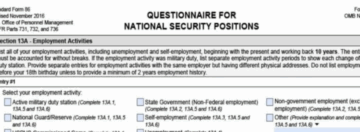Domestic Violence and Security Clearance Applicants
The Washington D.C. metropolitan area is home to over one million security clearance holders who work for intelligence agencies, military branches, other federal agencies, or are federal contractors. Many of these clearance holders have access to information and systems beyond the capability of the average citizen. According to a Washington Post article, some of these clearance holders have used their special access as a security clearance holder to intimidate, control, or prevent their spouses from reporting domestic violence issues to authorities, or from seeking outside help. These particular clearance holders used their position of power to create feelings of doubt, paranoia, fear, or even guilt in their spouse by downplaying the seriousness of the issues, telling them no one will believe them, threatening bodily harm or even death, or making pleas to the effect that if the spouse sought help it would adversely affect their clearance status.
Federal agencies and contractors had previously been reluctant to acknowledge that domestic violence among clearance holders was a serious issue, and generally were reluctant to take any actions that might affect the individual’s clearance status. However, with recent congressional hearings on reforming clearance processes in the wake of recent violent incidents, as well as the call to overhaul requirements for continuous evaluation, more attention is now focused on domestic violence issues involving clearance holders. Questions on the SF-86 were changed in 2010 and ask specifically about any charges that involved domestic violence or any protective orders filed against them.
Continuous Monitoring and Domestic Abuse
The bottom line here is this: domestic violence is a form of assault against a spouse, family member, or cohabitant, and can involve emotional, verbal, physical, economic, and sexual abuse. Security clearance holders are held to a high standard and this type of conduct is not in keeping with being granted eligibility for access to national security information. Changes in continuous evaluation processes will give investigators greater access to records involving domestic violence and these records will be reviewed by adjudicators to determine if there are patterns of violent or abusive behavior.



Comment Archive
My former neighbor holds a secret clearance. He went completely off the rails and was ultimately convicted of stalking and harassing his now ex-wife, resulting in GPS monitoring, probation and some jail time. Given his mental state, I reached out to his security office to give them a heads up. They couldn’t have cared less. I guess they’ll look into it at his ten year update, in about 7 years.
There needs to be a central office where people can report serious indiscretions. An easily obtainable phone number or website where people can notify authorities when the clearance holder isn’t. Yes, there may be some vindictive reporting but if the information can be corroborated through records and official means than it would be very helpful.